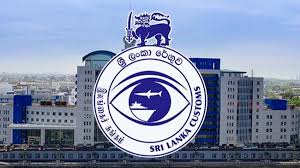-By A Special Correspondent

(Lanka-e-News -12.Jan.2025, 8.40 PM) Ah, Sri Lankan Customs—an institution often seen as the “unsmiling uncle” of the shipping world. The topic might not seem as glamorous as the beaches of Bentota or the tea estates of Nuwara Eliya, but for shipping companies, freight forwarders, and businesses alike, it’s a bureaucratic monolith whose inefficiencies cast a long shadow over the nation’s economic ambitions.
The short answer to whether Sri Lankan Customs is fit for purpose might be: only if that purpose is to frustrate, confound, and occasionally inspire Shakespearean levels of tragedy. But to truly unpack this situation, let’s don our investigative hats and delve into why this once-promising player is struggling on the global stage.
Let’s start with the numbers: Colombo Port, a pivotal re-export hub in South Asia, receives 2,500 containers daily. On paper, this is a testament to its strategic location and capacity. But in practice? Only a meager fraction of those containers are cleared in time. The backlog is so severe that MSC, one of the world’s largest shipping lines, recently turned away 27 cargo ships without offloading—a diplomatic slap in the face to the port’s reputation.
Why the delay? Critics point to a system as outdated as a 1990s dial-up modem. From sluggish procedures to a lack of digitization, Sri Lankan Customs appears stuck in a bygone era while its competitors—Singapore, Malaysia, and even neighboring India—sprint toward modernization.
In a world where customs departments are adopting technologies like QR barcodes, real-time tracking, and 24/7 clearance, Sri Lanka’s reluctance to upgrade is baffling. Colombo’s port could have been a jewel in the region’s shipping crown; instead, it’s beginning to resemble a rusty cog in a creaking machine.
In a bid to tackle these inefficiencies, the government is finally pushing for round-the-clock operations. Two new clearing locations, in Bloemandel and Kerawalapitiya, are also in the pipeline. While this sounds promising, critics remain skeptical. It’s one thing to keep the lights on 24/7; it’s another to ensure that those working in those extra hours are trained, equipped, and motivated to deliver results.
Moreover, the problem extends beyond customs itself. Regulatory bodies like the Sri Lanka Standards Authority, Plant Quarantine, and agricultural oversight departments must also embrace 24/7 operations to ensure seamless container clearance. Without synchronized reform across all stakeholders, the bottlenecks will persist.
Now let’s address the elephant in the room—or rather, the elephants—that have allegedly made their way to Dubai and Australia.
Sri Lankan Customs has long been dogged by accusations of corruption, with rumors of officials amassing suspicious wealth that would make even a lottery winner blush. Properties in foreign lands, luxury vehicles, and mysterious bank accounts have become the stuff of legend.
The honest majority within customs may feel unfairly maligned, but it’s the dishonest few who continue to tarnish the institution’s image. Lessons could be learned from countries like India, Malaysia, and Singapore, where rigorous anti-corruption frameworks ensure accountability. In India, for example, customs officers’ wealth is periodically audited by independent regulatory bodies. Malaysia and Vietnam have taken it a step further by enforcing anti-corruption laws that have led to high-profile arrests and long-term prison sentences.
Sri Lanka, too, must adopt similar measures. Transparent auditing, whistleblower protections, and periodic checks on customs officials’ financial records could go a long way in restoring public trust. A hotline for reporting corruption could empower citizens to participate in this cleanup operation—though, given the current levels of skepticism, you might need to incentivize them with more than just moral high ground.
If there’s one country Sri Lanka could emulate, it’s Singapore. The island nation’s customs system is a marvel of efficiency, blending cutting-edge technology with ruthless accountability. Importers can track shipments in real time, while a digitalized release system ensures goods are cleared swiftly.
But Singapore’s success isn’t just about technology. It’s also about cultivating a culture of integrity. Customs officials there are held to the highest standards, with strict audits and little tolerance for even minor infractions. The result? A customs system that’s not just fit for purpose—it’s fit for envy.
In theory, public intervention could play a role in cleaning up Sri Lankan Customs. If citizens report suspicious activity and hold officials accountable, it could create a ripple effect of transparency. But let’s not underestimate the risks. In a culture where whistleblowers often face retaliation, encouraging people to step forward will require robust protections—and perhaps a dash of bravery.
This isn’t just about frustrated importers or idle cargo ships. The inefficiencies at Sri Lankan Customs have far-reaching consequences for the national economy. Delayed shipments disrupt supply chains, erode investor confidence, and tarnish the country’s reputation as a trading hub.
The IMF and other international organizations have already raised concerns about these systemic issues. If Sri Lanka fails to address them, it risks losing out to regional competitors. Ports in India, Bangladesh, and even smaller players like Vietnam are waiting in the wings, ready to snatch business away.
The problems plaguing Sri Lankan Customs are daunting, but they’re not insurmountable. With the right mix of technology, accountability, and political will, the institution could transform itself into a model of efficiency.
But here’s the kicker: it won’t happen unless there’s a collective push from all stakeholders—government, businesses, and citizens alike. Whether it’s through adopting digital systems, enforcing anti-corruption measures, or simply working longer hours, the time for half-measures has passed.
Sri Lankan Customs may be many things—archaic, inefficient, and occasionally infuriating—but with the right reforms, it could yet become something greater: fit for purpose. Or, at the very least, fit enough to ensure that no more cargo ships leave Colombo with their containers still on board.
---------------------------
by (2025-01-12 15:22:15)
Leave a Reply